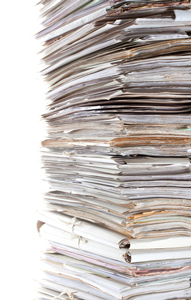If observation is the first precept of science, then good documentation is not far behind. I'm old enough to remember shelves full of bound lab notebooks. Many of these had pages pre-formatted to force you to sign and date every single entry. And, the fact that they were bound prevented people from keeping odd notes on loose sheets—not to mention making it difficult to remove pages to, uh, adjust results.
But then, bound books could be lost or damaged, and penmanship skills of lab workers were not always the greatest. Such, though, is the nature of science's paper trail.
Stories abound of Nikola Tesla's miraculous inventions—and their documentation—being lost in fires or confiscated by the government. There are also cases like Billy Hinchen's, whose PhD research data was backed up, but only to local media, and was lost (actually, stolen in this instance).
When the lab in question is a healthcare operation, this paper trail multiplies: Reams of memoranda, tickets, order sheets, and copies (in triplicate) of even the most basic forms. The paper blizzard can become overwhelming and labor-intensive. No doubt, this contributes to the shocking finding that medical errors are now our third leading cause of death.
The notion that excessive medical paperwork can affect patient care is hardly novel. Likewise, we have to figure out how to better manage the paperwork—virtual and otherwise—in medical laboratories. After all, 60-70 percent of medical decisions are influenced by diagnostic tests. Sadly, things can go wrong.
According to Steven Fuhrman, Managing Director of Sampleminded:
"Managing mission critical specimens and test results for research and diagnostic labs involves broad experience in software development and bioinformatics, as well as an understanding that every lab's process is unique. By tailoring our software to a fit each customer's specific workflow we can reduce or even eliminate the need for paper logs or forms."
More than that, better data handling can improve patient outcomes. There's no shortage of stories on the impact of Big Data on healthcare.
I'll give the last word to Claire Anderson, Product Manager at Sampleminded...
"Early in my career, I accepted a position as a specimen tracking coordinator. Only a few years out of college, I thought the title sounded impressive. In actuality, I soon found myself poring over hundreds of spreadsheets, sent from all over the world, trying to figure out what samples were available to analyze, and what was missing."
"Whether or not your organization will choose to implement a new system or improve on the one currently in place, my hope is that the clinical research community will continue to invest in more streamlined and efficient sample management processes. After all, every research sample is extremely valuable—but only if you can find it first."

